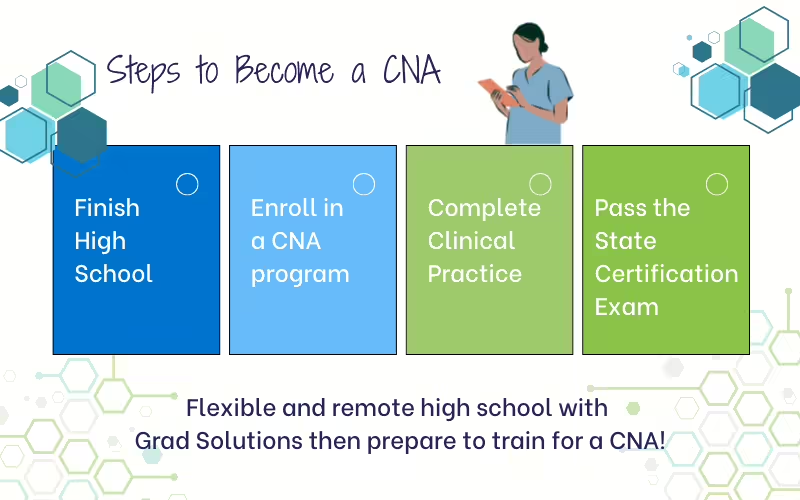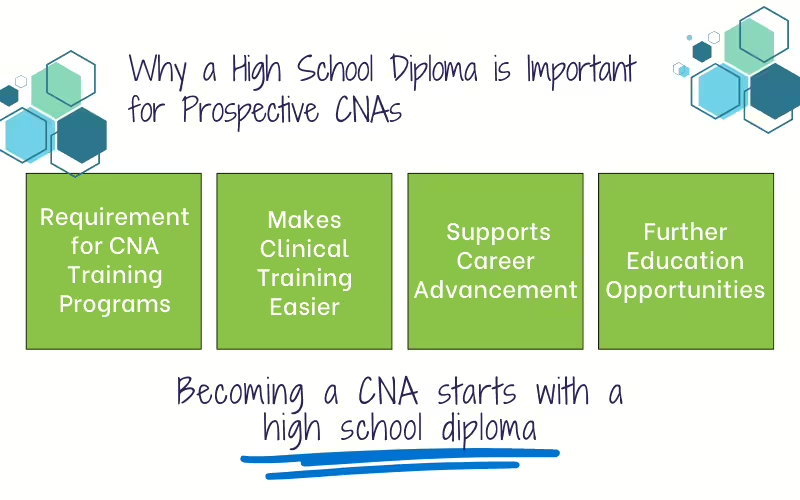Online School
Do You Need a High School Diploma to be a CNA? Educational Requirements & Expert Guidance

There is a demand for compassionate, skilled, and qualified healthcare professionals in the healthcare field today. One job that offers quick and easy entry into this high-demand field is a Certified Nursing Assistant (CNA). CNAs are critical in ensuring patients’ daily needs are met, supporting them with essential tasks such as hygiene, mobility, and nourishment. The average annual wage for a CNA in Arizona is $37,620, which is higher than the national average of $36,220.
As the population ages and healthcare needs increase, CNAs will continue to be in high demand in hospitals, nursing homes, and other healthcare facilities. If you’re considering pursuing a career as a CNA, you’re probably wondering about the educational requirements for this entry-level position. Many prospective CNAs ask a crucial question: is a high school diploma necessary to begin this career path? Let’s explore what it takes to become a CNA, the educational prerequisites, and how to take steps toward this rewarding profession—even if you don’t yet have a high school diploma.

Educational Requirements for Becoming a CNA
Becoming a Certified Nurse Assistant begins with enrolling in a CNA training program. These programs are designed to teach the essential skills required to care for patients in various healthcare settings. But what are the basic educational requirements for entering a CNA program?
A high school diploma or equivalent, such as a GED, is required to enroll in a CNA training course in most states. However, there are exceptions. Some vocational schools or community colleges may allow students to take CNA courses without a high school diploma, although this is less common. It’s worth noting that having a diploma makes it easier to access training programs and opens additional career opportunities.
Even if a diploma is not required for admission into a CNA program in your area, it may still be an essential asset for future career growth. With this credential, you could avoid limitations when seeking employment, further education, or certifications.
State-Specific Requirements
While the basic framework for CNA certification remains similar across the U.S., the specifics of the process vary from state to state. Typically, state requirements include completing an approved CNA training program and passing a state-administered competency exam. This CNA exam ensures aspiring students have mastered the skills and knowledge required to perform their duties.
In many states, being listed in the state’s nurse aide registry is critical to gaining certification. Some states require proof of a high school diploma or equivalent as part of this registry process. For example, certain states require candidates to submit this documentation to be eligible for their nurse aide registry. Additionally, a clear TB test and up-to-date vaccinations are often required for careers in the healthcare field.
Before enrolling in a CNA program, you must check the state’s requirements where you plan to work. This ensures you understand the educational and clinical prerequisites you’ll need to meet to become certified.
Arizona CNA Requirements
In Arizona, aspiring CNAs must complete at least 120 hours (about 15 days) of training, which includes classroom instruction and clinical experience. This clinical training is essential, as it allows students to apply what they’ve learned in a real-world setting under the supervision of a qualified healthcare professional. Arizona’s requirements emphasize the importance of hands-on experience, and completing these clinical hours is mandatory for certification.
Additionally, CNA candidates in Arizona must pass a state competency exam to earn certification. The state’s nurse aide registry ensures all CNAs meet these qualifications before working in healthcare settings. While a high school diploma is not strictly required to begin CNA training in Arizona, having one can still be beneficial for securing future employment and advancing your career.
Training and Clinical Experience
Becoming a CNA involves much more than just studying from textbooks. A key component of CNA education is clinical experience, where students learn and practice direct patient care skills in a healthcare environment. CNA programs typically consist of classroom instruction, laboratory, and hands-on clinical practice.
During classroom instruction, students learn about human anatomy, infection control, primary patient care, and other essential healthcare concepts. Once they understand these fundamentals, students transition to the clinical portion of their training where they apply their knowledge by working with real patients in supervised settings.
A high school diploma often gives students a solid foundation to excel in the CNA classes and clinical components of CNA training. It helps ensure they have the basic skills to understand and apply the material effectively. However, even if you don’t have a diploma, completing a CNA program is possible. It will require dedication and hard work to meet the training and clinical experience requirements.
Most states, including Arizona, require a clinical skills evaluation for the certification exam. This test assesses whether students can demonstrate competence in essential CNA tasks, such as taking vital signs, assisting patients with mobility, and maintaining hygiene standards.

Why is a High School Diploma Important to Become a CNA?
While some states and vocational schools may allow students to begin CNA training without a high school diploma, that doesn’t mean it isn’t essential. Having a diploma offers several advantages for those wishing to pursue a healthcare career.
First, most CNA training programs require a high school diploma or equivalent as an essential admission criterion. This can limit your options if you haven’t completed high school, as you may find fewer programs available. Additionally, care facilities that offer on-the-job CNA training may prefer candidates with a diploma, as it signals a certain level of educational achievement and commitment.
Completing high school also smooths the transition to further education, as it provides foundational skills in reading, writing, and critical thinking—all of which are vital for success in the medical field.

How Grad Solutions Can Help
If you’re interested in becoming a CNA but haven’t yet earned your high school diploma, Grad Solutions can help you achieve your diploma and career goals. Grad Solutions offers a free, flexible online high school program designed to meet the needs of students who want to complete their education independently.
The best part is you can be enrolled in a CNA training program while completing your diploma with Grad Solutions. This allows you to start building your career while working toward meeting the educational requirements needed for certification. Grad Solutions provides resources such as mentoring, counseling, and tutoring to ensure students have the support they need to succeed.
If you’re passionate about patient care and want to take the first step toward a fulfilling career as a CNA, there’s no better time to begin. Completing your high school diploma with Grad Solutions will open doors to training programs, employment opportunities, and further education in healthcare.
Take charge of your future today! Enroll in Grad Solutions’ free online high school program and start your journey toward becoming a Certified Nursing Assistant. With a high school diploma and CNA certification, you’ll be well-equipped to positively impact patients’ lives and thrive in the healthcare field.
Resources:
https://www.bls.gov/ooh/healthcare/nursing-assistants.htm
https://www.ncsbn.org/exams/nnaap-and-mace/nnaap-exam.page
https://www.premiernursingacademy.org/certified-nursing-assistant/cna-career-paths/